One of the best summaries that I read of the increase in value of GameStop stock last week was from Wall Street Journal reporter Jason Zweig. Mr. Zweig’s was by no means the only article written about the subject. I found nine GameStop articles published over the past three days on Forbes.com and assume many more are on the Wall Street Journal site.
For the uninitiated, GameStop bills itself as the world’s largest retail gaming destination for Xbox One X, PlayStation 4, and Nintendo Switch games, systems, consoles, and accessories. Unfortunately, the popularity of digital gaming (83% of the market in 2018) has caused GameStop stores to lose a lot of business. The company has lost so much business that it closed 321 stores in 2019, pre-pandemic.
Naturally, with the company’s business model impacted by the rising popularity of digital game downloads and the pandemic’s social distancing orders in 2020 triggering the closures of GameStop retail stores in many states, GameStop’s financial woes have negatively impacted the value of its stock.
If a company’s stock value declines and its future earnings prospects are not good, the situation could trigger investors who bet on the future decline of the stock price by signing contracts for selling a specified amount of the stock at a certain price within a certain timeframe. The contract becomes the option agreement that investors may choose to purchase. When an investor purchases a “put option”, they pay a specified amount for that contract.
If the stock price continues to decline, the buyers of the put options make money. If the stock price remains the same or increases, they usually lose the money they paid to purchase the option.
But if the stock price increases, the maker of the put option contract may be in a vulnerable position because the contract requires them to deliver a certain number of shares at a price that is below where the stock is selling. Depending on the contract (not secured by holding any shares vs. holding a certain percentage of the shares in the contract), the obligor to the contract may be required to put up additional collateral or cash if the contract is in a loss position (underwater) as the contract nears its expiration.
An investor who participates in Reddit’s r/WallStreetBets investment forum noticed that the total number of shares of GameStop stock that had been shorted exceeded the entire amount of previously issued and unretired GameStop stock. He suggested that the investors in the forum buy GameStop stock with the hope that the increased purchase activity would drive up the price of the stock and create a market condition called a “short squeeze.”
A short squeeze occurs whenever the price and demand for a stock is rising, and a major tranche of put options are coming due. Because the contract calls for the delivery of some stock (contract specific), the obligor under the contracts goes into the hot market to try to buy enough stock to cover the contract. That increased activity usually increases the price of the stock because it increases the demand for that particular stock.
The purchases of GameStop stock by the individual members of the Reddit investment forum triggered a huge demand for the stock and a rise in the share price. Within two days, the stock was the most heavily traded stock in the world. The idea’s originator claims to have turned a $50,000 investment into a $40 million profit.
One of the hedge funds that participated in a substantial number of the put options (or could have been an obligor on the options or a short seller) on GameStop stock, Melvin Capital, had to get a $2.75 billion investment in order to meet its obligations due to the stock’s increase in value. A startup online brokerage firm that offers commission-free trades, Robinhood, had to stop investor trading in GameStop stock until it could get a $1 billion cash infusion to cover the settlement volume of trades going through its accounts (note, as of today, Robinhood announced that it received an additional cash infusion of $2.4 billion).
Even before Robinhood stopped trading in GameStop stock, the huge increase in trading volume and extreme increase in GameStop’s stock price (up 500 percent), had triggered the attention of politicians and regulators. Two politicians whose political views are at opposite ends of the political spectrum, Sen. Elizabeth Warren and Sen. Ted Cruz, called for the brokerages who suspended trading to resume trading in GameStop stock.
Sen. Warren, who led the Consumer Financial Protection Bureau (CFSB) before she became a senator, has called for the Securities and Exchange Commission (SEC) to investigate the activities of the “hedge funds, private equity firms, and wealthy investors who have treated the stock market like their own personal casino while everyone else pays the price.”
It’s too soon to know the outcome of the GameStop story. In addition to GameStop, there were three other companies (AMC Entertainment Holdings, iRobot Corporation, and BlackBerry Ltd.) whose stock prices surged last week due to a similar situation. In that case, individual investors purchased heavily shorted stocks, and obligors under the contracts had to purchase shares in the market to cover their contract requirements.
I am sure that the SEC will investigate the situation and that Congress will conduct hearings as well. Today, the markets will open again for trading and we’ll see what happens with the stocks I mentioned. Since most put contracts have an end date near the month, there may be a period of lower trading volume until the next tranche of contracts near expiration.
Regardless of what you believe about GameStop as a company, the stock is trading much higher than the fundamental values indicate that it should trade. Eventually, the price will come down.
There are many opinions about the GameStop situation. Even among educated and experienced financial professionals, the opinions can vary widely.
As someone who has been a public company Chief Financial Officer (CFO) and Chief Executive Officer (CEO), I am very familiar with the nuances of stock value fluctuations as it relates to trading volume, demand for stock, and the volume of put and call options on a company’s stock. It’s my intention to discuss some of my personal opinions as well as report on the opinions of others in a follow-up article or two. At the same time, I don’t claim to be an option expert, nor do I believe that my brief explanations in order to discuss this topic cover the wide variety of options that are available in the market. For that reason, I hope to have a follow-up guest post with a more technical explanation than mine in this post. As always, your comments are welcome.











